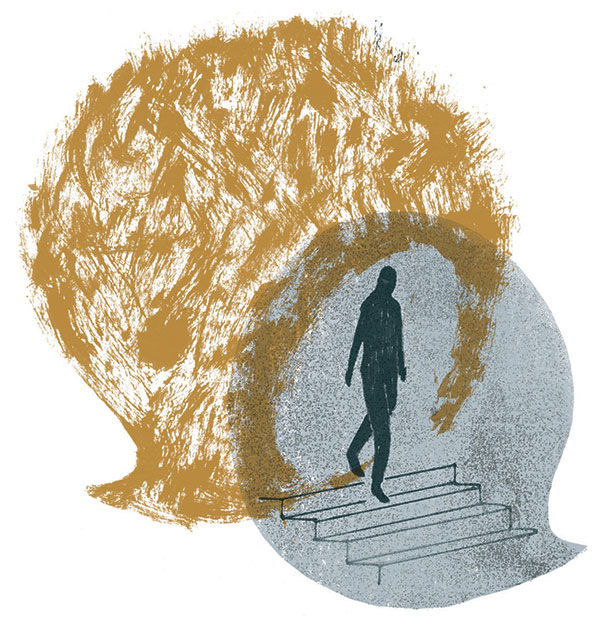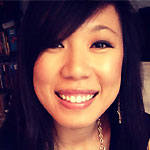
Outwardly, my life seems very put together. I was born into an upper middle class family; my parents are married; I have a loving husband and a beautiful son; I graduated from the University of California in Los Angeles; and I work as an oncology nurse.
But inwardly, an underlying darkness permeates the happy memories that color my personality.
I am a survivor of childhood sexual abuse. And though I've grown from the trauma, I have never felt completely freed from its bondage.
• • •
Growing up, my parents were busy people and it was hard to get their attention. I often felt unnoticed and unimportant. I desperately wanted to be heard and loved, but I often felt like my parents didn't know me. This feeling was exacerbated by the traditional Asian American culture I grew up in — where I learned that I was accepted when I was good, and where being angry and speaking out of turn were considered bad.
For as long as I can remember, my parents would drop me off at my aunt and uncle's house for the weekend when they traveled. Weekends soon became weeks. For over 10 years, I lived under the authority of my uncle, who took advantage of my body and my mind. The details of the abuse come and go from my consciousness — sometimes foggy, sometimes clear. But somewhere within those years, my voice was silenced.
My uncle silenced more than just my audible voice by threatening to kill me if I spoke of the abuse. He silenced my power, my will, my strength, my sense of self. What was left of me was empty, hollow, and scared. I was ashamed of who I was. I adapted in the only way I knew how — I learned to show only what I thought people wanted to see.
Shame and isolation fueled my fears — fears of abandonment by the ones I thought would love and protect me; fears of pain and suffering; a paralyzing fear that, somehow, I deserved all this. I was all alone, trapped, and powerless in this hell, believing painful lies about who I was and what my life was worth.
• • •
I became a Christian in college. For the first time, I was told my life was valuable. As I became more vulnerable in my relationships, certain conversations began to trigger memories of my abuse. God started to gently open this part of my life that had laid dormant and untouched for so long that it was unbearably painful to remember.
People close to me encouraged me to go to counseling. This began a slow and difficult journey toward healing my wounded soul. The majority of the next 10 years involved connecting to my sadness over the many things I had lost in my life at an early age: my childhood, my innocence, my identity, my voice.

Many of the things I learned about authority when I was growing up affected the way I related to God and how I believed He related to me. Being good meant love and acceptance, and I wholeheartedly wanted to be a good Christian. But I had learned that authority was violating; authority didn't want to hear or understand me. When I revealed the real and raw parts of me, I was silenced.
At times, church reflected similar messages. I was told that anger, depression, and suicidal thoughts were sinful and symptoms of not trusting God. So though I held onto Romans 8:28, my heart couldn't connect emotionally.
I was familiar with disconnecting. In order to survive the abuse as a child, my mind subconsciously disconnected from my feelings so I wasn't constantly overwhelmed. I needed this defense to function, to suppress the painful feelings of abandonment and utter helplessness.
But though I learned how to push these feelings down, they were never fully erased. So these intense emotions resurfaced when I became an adult, when I sought to relate to others vulnerably. My defenses started crippling my relationships, including my relationship with God.
• • •
I began to wrestle with God because I didn't believe He was different than the authority of my childhood. I asked myself: Can I be angry at God? Does God love me in my anger?
After a series of difficult events last year, I realized I wanted to connect to my anger. I stopped asking others to tell me where I should be in my journey of healing. I finally gave myself permission to feel angry and gave words to the deep aching inside.
I'm angry at my parents for abandoning me with a violent man who would ravage and torture my body for his own pleasure; for not knowing me well enough to know something was wrong.
I'm angry at my uncle for taking away my innocence and twisting my sexuality into something beyond recognition; for his threats that stripped my voice of the power it was supposed to have.
I'm angry at myself for believing I'm not wanted, that I'm not heard or seen by people who matter to me in my life; that it's okay for people to violate my boundaries without consequence; that I don't deserve good things; and that I'm not worthy of love and belonging.
And I'm angry at God because He allowed all these things to happen to me.
Feeling my anger toward the things that are wrong in my life allowed me to be real. Slowly, I started to give God the ugly, angry, and painful parts of me. In exchange, I asked for His truth, acceptance, and love. Connecting to my anger meant I was finally able to bring this part of me to God. Being numb and denying my anger only caused me to hide a deeply injured part of my heart from Him.
I am learning the importance of using my voice to communicate my feelings. Communicating enables me to experience relationship, and being in healthy relationships reminds me that I am no longer alone. Anger is a drive to protest, to declare that something is not OK. I finally used my voice to express my anger to God. In the darkness of my anger, God's response was: My love is able to take your anger, My love is able to hear and accept you in it.
This connection with God was what my heart had been wanting and needing all of my life. Unlike the authority of my childhood, God didn't abandon me when I was angry. He allowed me to be angry and He respected my space. He didn't push His way onto me. Instead, He waited patiently for me. When I was ready, He reminded me of His love and of His sovereignty.
God used the book of Jonah to speak to me. This book showed me a picture of God relating to a man who was angry. Jonah ran away when he was called to preach salvation to a people group he hated. My heart softened when I saw that God did not reject Jonah — God still used Jonah — despite the anger and turmoil in his heart. God's plan was greater than Jonah's feelings, yet God took the time to listen to and comfort Jonah.
Jonah reminded me of the words of Jesus as He hung on the cross, "My God, My God, why have You forsaken Me?" (Matthew 27:46 NIV). The words of French playwright Pierre Wolff really resonate in my heart: "If Jesus in all His perfection had the audacity to ask His Father 'Why?' we can express to God all our whys, since the why of the Son of Man embraced ours. None of our whys can be excluded from His, because all of our whys are healed through His."
• • •
I still have a long way to go, but this last year has been healing to me because I am learning that it's OK to be angry when we suffer. God loves me in my anger, grief, and despair, with a powerful love that wants me in the midst of all my brokenness. His love digests my anger, and it is miraculously liberating.
Each night I tell my son, "I love you when you're glad, I love you when you're sad, I love you when you're mad, I love you when you're bad. I love you all the time." God loves us in the good times, but He loves us especially in the hard and painful times, the times when we may be so mad and angry that our tears cloud our eyes from being able to clearly see Him. I pray we may know in these moments that our God is with us, and because of the cross, He loves us in it all.

Madeline Wu is a chemotherapy infusion nurse and appreciates walking alongside her patients in their journey and battle with cancer. Madeline loves reading equally as much as she loves food. She often drags her husband, Jeff, and son, Jeremy to accompany her quest to satisfy her many different food cravings.
